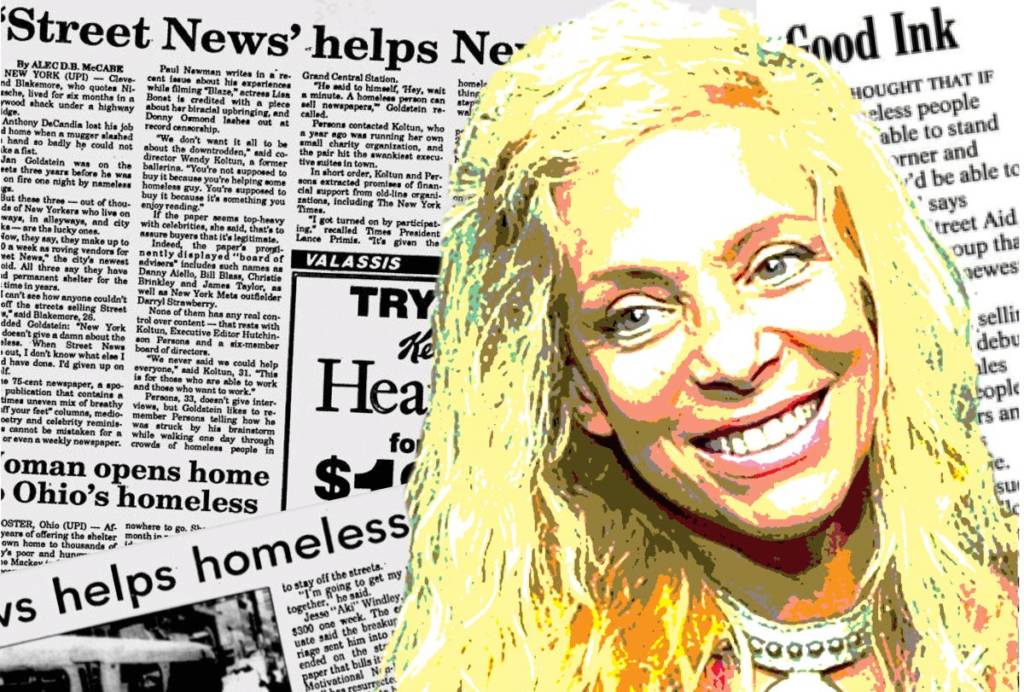In 1989, Wendy Oxenhorn was approached by a rock musician to find a way to help people experiencing homelessness in New York City. Hutchinson Persons wanted to organize a large concert that would function as a canned food drive. He had heard of Oxenhorn’s previous work caring for children neglected by parents staying in a particular welfare hotel at the time. She was ready to help homeless people, but “didn’t think a canned food drive would be solution-oriented,” Oxenhorn recalled in an exclusive interview. “I learned as a single parent that you really have to be solution-oriented. It’s not the Band-Aids you really need.”
Together they developed a business plan to provide work and income opportunities for people experiencing homelessness by selling original newspapers. They founded Street News and approached two prospective vendors to start. This was not Oxenhorn’s first or last creative venture in social work, but one of many unique projects she has been a part of. While Street News folded years later, Oxenhorn and Persons’ business model spread like wildfire as independent street papers were established city-by-city worldwide. Today there are 112 street paper published in 35 different countries, according to the International Network of Street Papers—a member organization founded in 2004. “I was in Paris last year and someone came up to sell me a street paper and I took out my Euros and got weepy,” Oxenhorn said. “I really did. It was a very beautiful, private, quiet moment.”
For the past 16 years, Oxenhorn has been helping blues and jazz musicians in need connect with housing, healthcare, and ways to give back through music education. She was recently recognized as a Jazz Master by the National Endowment for the Arts (NEA) in a ceremony hosted at the Kennedy Center. Performers Gary Burton (who Street Sense Vendor Ken Martin interviewed), Pharoah Sanders, and Archie Shepp shared the stage and honors with Oxenhorn.
Street Sense’s own Sounds from the Street podcast producer, Adam Kampe, was recently able to catch up with Oxenhorn in New York City at “the greatest pizza place in the world” (Buca at West 103rd Street):

So you needed a solution-oriented action plan to help people?
One day Persons came back with an idea: ‘what about a newspaper?’ I said, ‘well, you can’t just give it out.’ We had to do this like a business so that it would be something of value. Otherwise it would have been something that was thrown out. We gave the first 10 papers to each member of the homeless sales force for free. After that, they had to pay us a quarter for every paper. They sold it for a dollar, making 75 cents. And we ended up getting the quarter back so we could produce the paper.
And somehow the New York Times got involved?
The president, Lance Premise—what a beautiful man. He didn’t want to meet with us at first. But by the end of it, he was on the board of advisors. He got hats for the homeless sales force. He got canvas bags for them that said Street News to carry their papers in. Isn’t that just amazing! When you’re homeless, it’s not like you have an address. It’s down and dirty business. And it’s pretty hard to get a job like that. So this was the beauty of it. All of a sudden you’re starting out and you’re selling papers. You’re working for your living which is the big complaint almost every person on the street says about someone who is begging: “get a job.” In fact, there was a point where they were all making more money than me. I remember, we finally got to a place where I could take $200 a week, and I was supporting my 2-year-old, and we just had macaroni and cheese every night—Kraft Macaroni and Cheese—and maybe sardines on a good day.
Why did the Metro Transit Authority design and fund your ad campaign?
Ironically, panhandling on the trains had just been made illegal—so there was a big article in the Times by Sam Roberts, asking what these panhandlers were going to do. So, I went to the MTA and said, ‘I understand that begging is not allowed. But imagine if there was something the homeless could sell that would get them work.’ And the MTA loved it! They gave us 3,000 posters in all the trains and buses. Then I contacted Mr. Roberts and told him I had something for those two panhandlers in his story to do. He came to see our office and the next day in the metro section on the cover we had our first story. And people knew. Then it went to the Wall Street Journal cover, then the Herald Tribune.
Some people seem skeptical about buying street papers. Did you ever experience people wondering where that money is really going or who are these people selling Street News?
For the first couple of months we had our guys coming in saying “I’m eating today” or “I bought my food today—I didn’t ask anyone for it.” The best part was when they started doing these little fly-by-night hotels for $28 a night. They were off the street from their own work. It was really special.
There’s so much of your backstory that I know you’ve been repeating kind of ad nauseam, based on your recent Jazz Master honor. So let’s jump into your entrance into nonprofit work. I know you were an aspiring dancer. And a tragic knee injury changed everything?
I performed ballets with the New York City Ballet and was just about to get into the company when we discovered I could barely walk. So I did what any red-blooded American drama queen would do: I called up a suicide hotline. I really did think that life was over. If I couldn’t dance, then this was it. And when I called up, a lovely woman answered. Halfway through the conversation she started telling me her troubles. People always told me their troubles. Three days later I was working at the suicide hotline, having counseled her successfully.
Then I started talking to young women with children—single parents—living in abandoned buildings. And so I started getting into the system with them and finding them housing. So now, all of a sudden, I was becoming a social worker.
I had a little organization with a woman named Carol Anne with which we took on a welfare hotel and we took care of 31 kids. A lot of parents were dealing with drug addiction… and one of the biggest issues was you’d have a single-mom prostituting in the park. And in a welfare hotel a child is not allowed to be left alone in the room, so the parents would leave the kids outside. At 11 at night you’d have a 7-year-old jumping rope in front of these places. These places were horrendous. The city was paying $2,000 a room to that hotel. There was no kitchen. They had a hot plate and kids were warming up hot dogs under the hot water from the faucet.
Again and again you seem to turn these setbacks into a new creation, a new endeavor. It’s a gift to be able to do that. Do you ever feel like you were born to do this kind of social work?
I feel like everyone is born to do what they’re doing. I think we get into trouble when we see ourselves separate from God (or our word for that). When you start to see yourself as separate, you start to do things for that other entity: to please that other it, to be forgiven by it. Instead, I believe that we are all part of this loving consciousness that birthed us somehow, this creative force that creates and creates. And as a result, we end up creating: we have children, we have work, we have art. We have whatever it is that we create in our day—even if its aggravation for someone else. I remember early on, I used to think that the more I did to help other people the better human being I would be. But It’s really not like that. It’s that the better and happier and more joyful you are—the more you have to give.
It’s all about the journey. That’s why you can’t get freaked out when terrible things happen. For example, I only picked up a harmonica and started playing one day because of heartbreak over an Italian man. And that harmonica turned out to be the first thing since Ballet that replaced that feeling of freedom and flying. Through it, I also eventually found the Jazz Foundation of America.
The missions at the heart of the various work you have done are very similar. What are you most proud of?
My single parenting. That is my biggest achievement. That is the hardest thing to do in this world.
This article is an excerpt of Wendy and Adam’s conversation. You can listen to more of Wendy Oxenhorn’s philosophy and journey—including her blues masterclass in Grand Central Station—in our next episode of Sounds From the Street. It is set to be released Wednesday, May 11 at StreetSense.org/audio and will also be available through iTunes, Google Play, Soundcloud and Stitcher.








